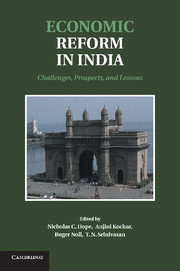Book contents
- Economic Reform in India
- Economic Reform in India
- Copyright page
- Contents
- Contributors
- 1 Introduction
- The Macro Economy
- Institutional Reforms: Agriculture and Education
- 5 Land Reform, Decentralized Governance, and Rural Development in West Bengal1
- 6 Market-Driven Agricultural Growth
- 7 India’s Higher Education Opportunity1
- 8 Improving the Quality of Rural Primary Schools: An Evaluation of a Computer-Aided Learning Program in South India
- Employment, Industrial Structure, and Poverty
- Infrastructure: Electricity and Transportation
- Index
5 - Land Reform, Decentralized Governance, and Rural Development in West Bengal1
from Institutional Reforms: Agriculture and Education
Published online by Cambridge University Press: 05 February 2013
- Economic Reform in India
- Economic Reform in India
- Copyright page
- Contents
- Contributors
- 1 Introduction
- The Macro Economy
- Institutional Reforms: Agriculture and Education
- 5 Land Reform, Decentralized Governance, and Rural Development in West Bengal1
- 6 Market-Driven Agricultural Growth
- 7 India’s Higher Education Opportunity1
- 8 Improving the Quality of Rural Primary Schools: An Evaluation of a Computer-Aided Learning Program in South India
- Employment, Industrial Structure, and Poverty
- Infrastructure: Electricity and Transportation
- Index
Summary
Since the late 1970s the West Bengal government has implemented comprehensive reforms of agrarian institutions including land reform (land redistribution, tenancy registration) and democratic decentralization (devolution of agricultural development program delivery to elected local governments). We provide an overview of our research findings concerning the accountability of local governments and the impact of their program interventions on farm yields and agricultural incomes. Programs administered by the local governments were reasonably well targeted to the poor, with a few exceptions. Targeting improved as local elections became more contested and deteriorated with greater socioeconomic inequality. The tenancy registration program, distribution of agricultural minikits, IRDP credit, and irrigation programs administered by local governments had significant effects on subsequent growth in farm productivity and incomes. The benefits diffused widely among farms within the village and trickled down to landless agricultural workers in the form of higher wage rates.
- Type
- Chapter
- Information
- Economic Reform in IndiaChallenges, Prospects, and Lessons, pp. 189 - 221Publisher: Cambridge University PressPrint publication year: 2013



